人教版八年级上册 Unit 2 How often do you exercise? Section A 知识点课件 (共57张PPT)
文档属性
| 名称 | 人教版八年级上册 Unit 2 How often do you exercise? Section A 知识点课件 (共57张PPT) | 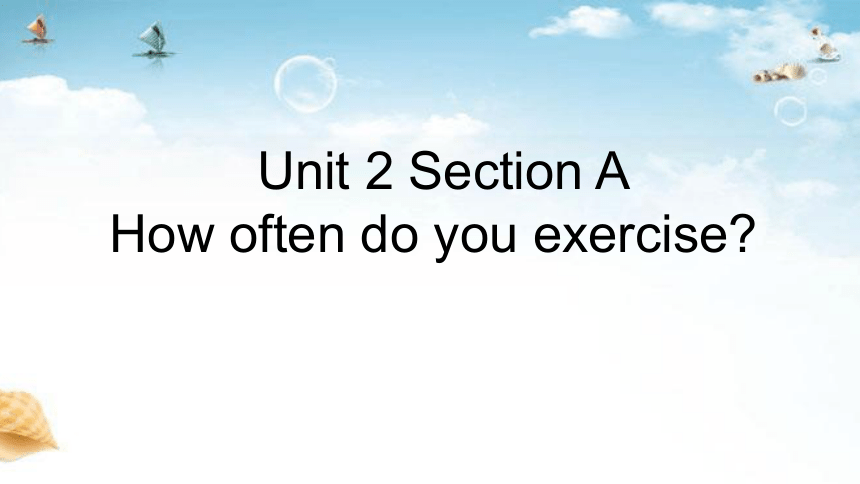 | |
| 格式 | zip | ||
| 文件大小 | 34.7MB | ||
| 资源类型 | 教案 | ||
| 版本资源 | 人教新目标(Go for it)版 | ||
| 科目 | 英语 | ||
| 更新时间 | 2022-09-15 20:35:04 | ||
图片预览

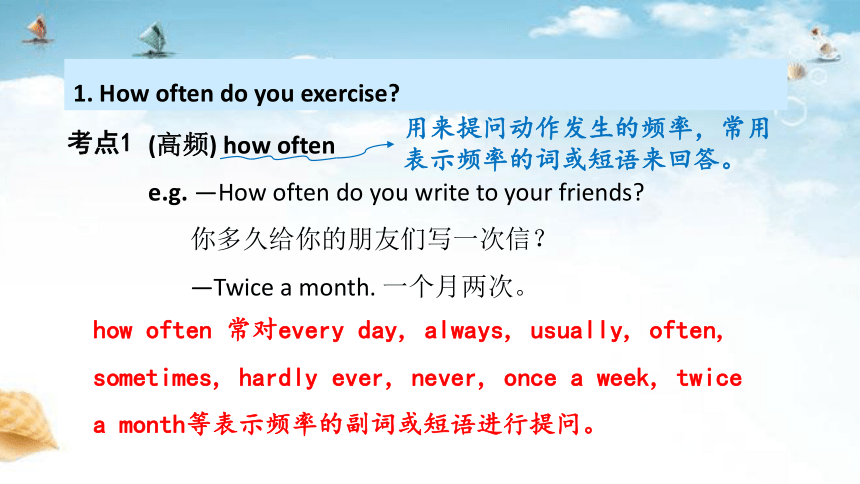
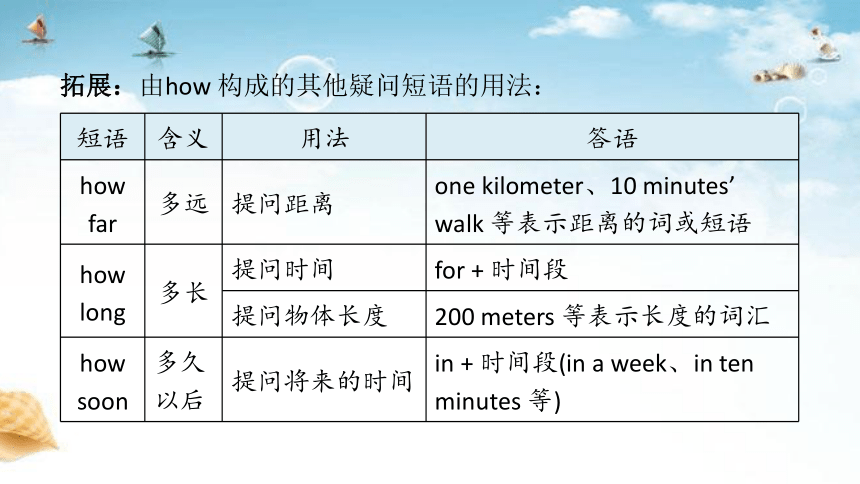
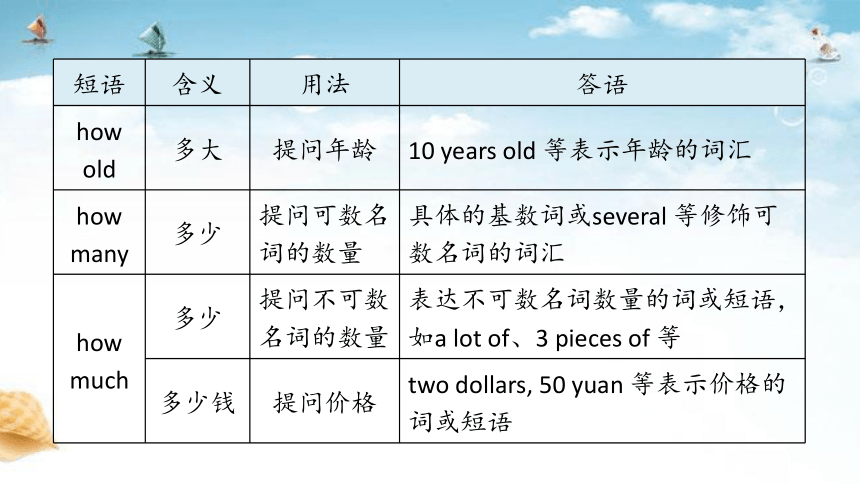
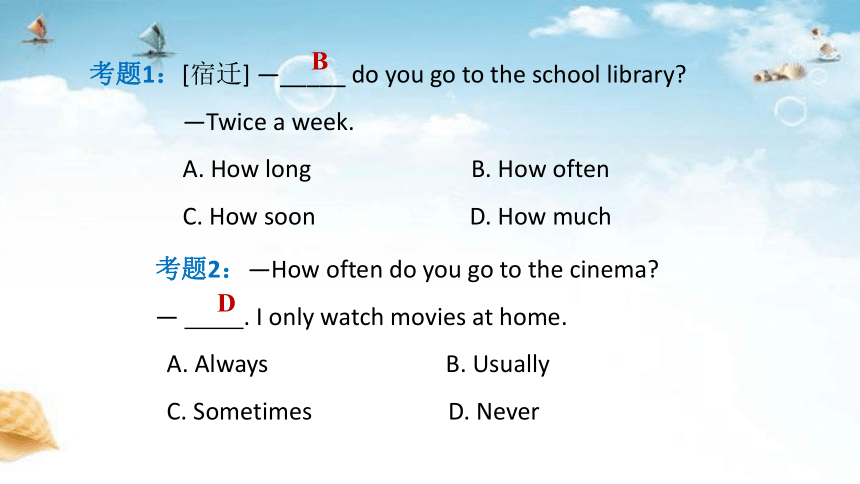
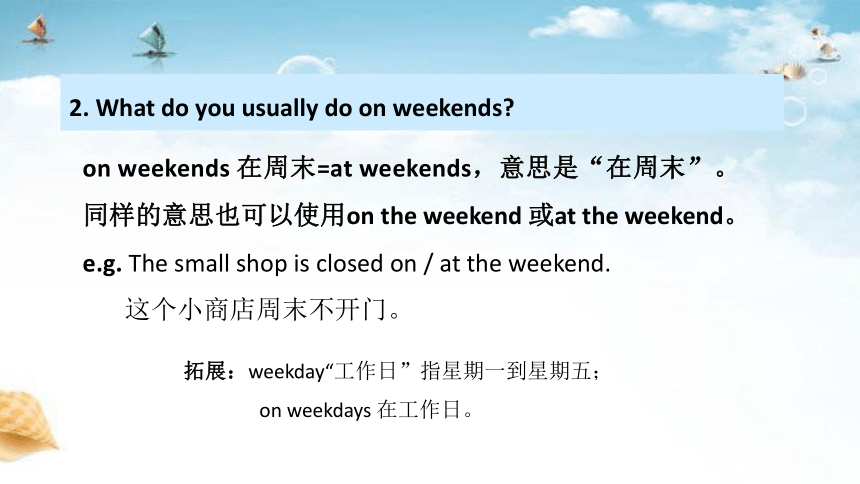
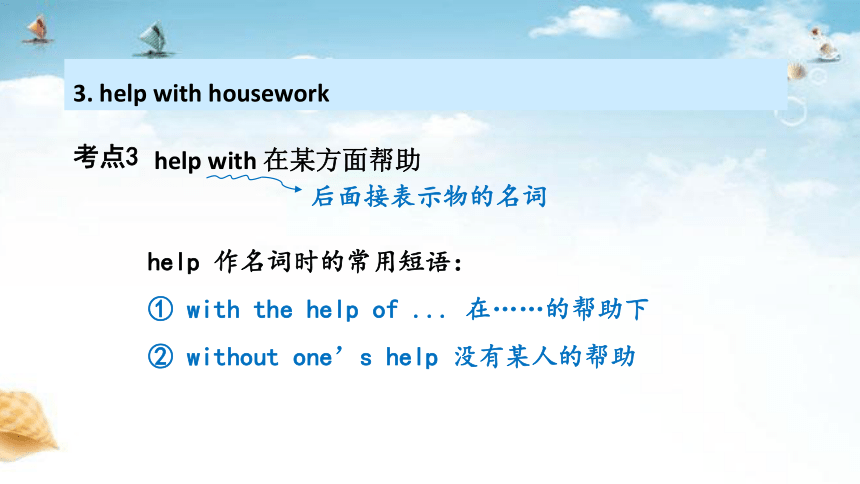
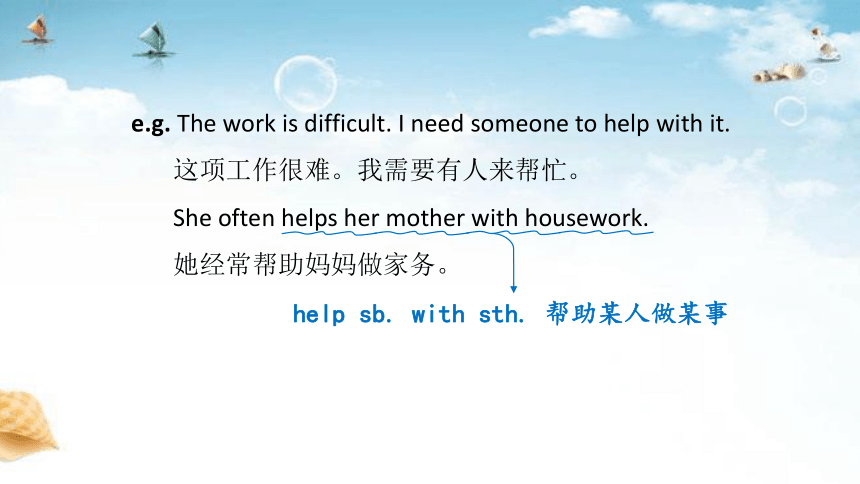
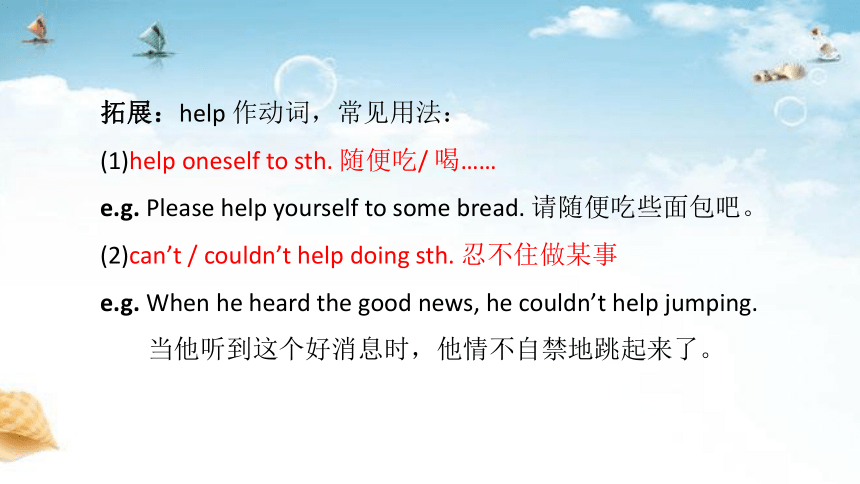
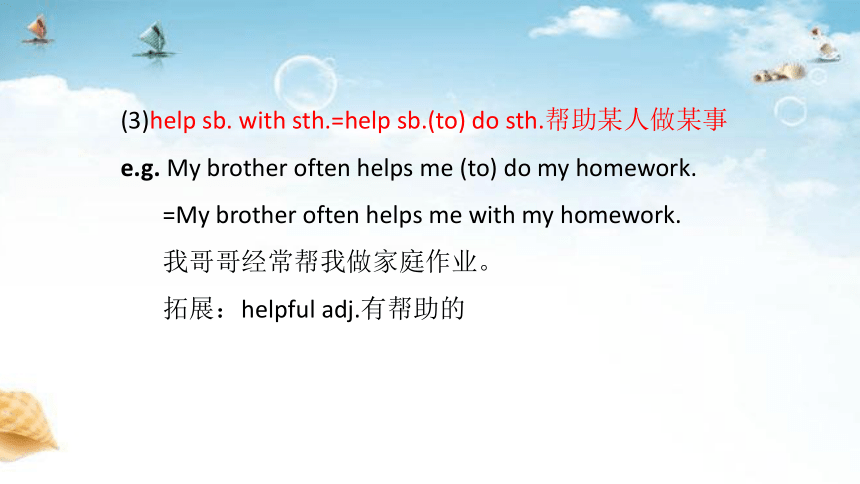
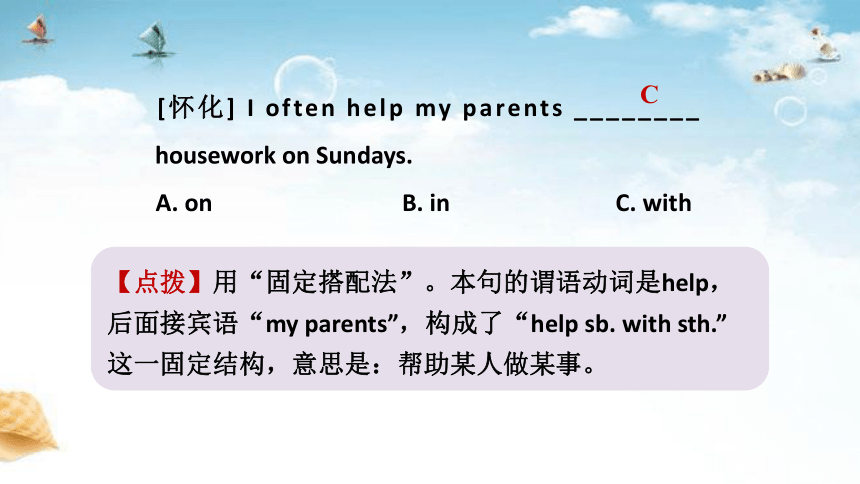
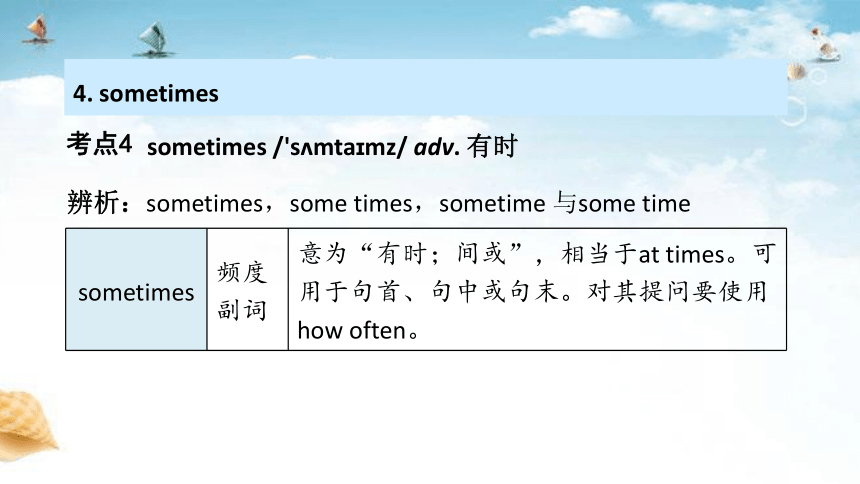
文档简介
(共57张PPT)
Unit 2 Section A
How often do you exercise
1. How often do you exercise
(高频) how often
e.g. —How often do you write to your friends
你多久给你的朋友们写一次信?
—Twice a month. 一个月两次。
考点1
how often 常对every day, always, usually, often, sometimes, hardly ever, never, once a week, twice a month等表示频率的副词或短语进行提问。
用来提问动作发生的频率,常用表示频率的词或短语来回答。
拓展:由how 构成的其他疑问短语的用法:
短语 含义 用法 答语
how far 多远 提问距离 one kilometer、10 minutes’ walk 等表示距离的词或短语
how long 多长 提问时间 for + 时间段
提问物体长度 200 meters 等表示长度的词汇
how soon 多久以后 提问将来的时间 in + 时间段(in a week、in ten minutes 等)
短语 含义 用法 答语
how old 多大 提问年龄 10 years old 等表示年龄的词汇
how many 多少 提问可数名词的数量 具体的基数词或several 等修饰可数名词的词汇
how much 多少 提问不可数名词的数量 表达不可数名词数量的词或短语,如a lot of、3 pieces of 等
多少钱 提问价格 two dollars, 50 yuan 等表示价格的词或短语
考题1:[宿迁] —_____ do you go to the school library
—Twice a week.
A. How long B. How often
C. How soon D. How much
B
考题2:—How often do you go to the cinema
— . I only watch movies at home.
A. Always B. Usually
C. Sometimes D. Never
D
2. What do you usually do on weekends
on weekends 在周末=at weekends,意思是“在周末”。同样的意思也可以使用on the weekend 或at the weekend。
e.g. The small shop is closed on / at the weekend.
这个小商店周末不开门。
拓展:weekday“工作日”指星期一到星期五;on weekdays 在工作日。
3. help with housework
help with 在某方面帮助
考点3
help 作名词时的常用短语:
① with the help of ... 在……的帮助下
② without one’s help 没有某人的帮助
后面接表示物的名词
e.g. The work is difficult. I need someone to help with it.
这项工作很难。我需要有人来帮忙。
She often helps her mother with housework.
她经常帮助妈妈做家务。
help sb. with sth. 帮助某人做某事
拓展:help 作动词,常见用法:
(1)help oneself to sth. 随便吃/ 喝……
e.g. Please help yourself to some bread. 请随便吃些面包吧。
(2)can’t / couldn’t help doing sth. 忍不住做某事
e.g. When he heard the good news, he couldn’t help jumping.
当他听到这个好消息时,他情不自禁地跳起来了。
(3)help sb. with sth.=help sb.(to) do sth.帮助某人做某事
e.g. My brother often helps me (to) do my homework.
=My brother often helps me with my homework.
我哥哥经常帮我做家庭作业。
拓展:helpful adj.有帮助的
[怀化] I often help my parents ________ housework on Sundays.
A. on B. in C. with
【点拨】用“固定搭配法”。本句的谓语动词是help,后面接宾语“my parents”,构成了“help sb. with sth.”这一固定结构,意思是:帮助某人做某事。
C
4. sometimes
sometimes /'s mta mz/ adv. 有时
考点4
sometimes 频度副词 意为“有时;间或”,相当于at times。可用于句首、句中或句末。对其提问要使用how often。
辨析:sometimes,some times,sometime 与some time
some times 名词短语 意为“几次;几回”,其中time 是可数名词,意思是“次;回”。对其提问要使用how many times。
sometime 副词 意为“在某个时候”,表示某个不确定或不具体的时间,常用于过去时或将来时,对其提问要使用when。
some time 名词短语 意为“一段时间”,常和延续性动词连用,对其提问要使用how long。
e.g. Sometimes a wandering mind can lead to a new creation.
有时走神可能会带来新的创造。
I have read the book some times. It’s very interesting.
这本书我读了好几次了。它很有趣。
I’ll visit your house sometime next week.
下周抽时间我会去参观你家。
He stayed in Qingdao for some time with his family and then left for Shanghai.
他在青岛和家人待了一段时间然后动身去上海了。
速记小法
分开是“一段”(some time),
牵手是“某时”(sometime);
分加s 是“倍;次”(some times),
合加s是“有时”(sometimes)。
Tom is a good student. He _____ does his homework after school, but ______ he plays basketball with his friends.
A. usually; often B. usually; usually
C. usually; sometimes D. never; usually
【点拨】考查频率副词。usually 意为“通常”,表示的频率大,sometimes 意为“有时”,表示的频率小。
C
5. hardly ever
(重点)hardly /'hɑ (r)dli/ adv. 几乎不;几乎没有
e.g. Without accumulating, we can hardly achieve anything.
不积跬步,无以至千里。
拓展:如果一个陈述句中出现hardly,改成反意疑问句时,附加部分要使用肯定式。前否后肯
e.g. He hardly goes to work by car, does he
他几乎不开车去上班,对吗
考点5
hardly作副词,本身表示否定,不能与否定词连用。
hardly 副词 意为“几乎不”,表示否定含义。常用在be动词或情态动词的后面,实义动词的前面。
hard 副词 意为“努力地;猛烈地”。
形容词 意为“困难的;坚硬的”。
辨析:hardly 与hard
语境串记:
I can hardly believe he is practicing hard in the yard. It’s hard to exercise outside when it blows hard. 我几乎不能相信他正在院子里努力训练。当风刮得很猛烈的时候在户外训练是很困难的。
There is hardly any rain in the area every year, _____
A. doesn’t there B. isn’t there
C. does there D. is there
D
When the rainstorm came, it began to rain ______ and the wind blew strongly.
A. hard B. hardly C. heavy
A
6. once a week
once /w ns/ adv. 一次;曾经
e.g. —How often do you go shopping
你多久去购物一次?
—Once a week. 一周一次。
考点6
表示频率,常用来回答how often 的
提问,其中once作副词,意为“一次”。
拓展:
(1)once 表示不确定的时间,意为“曾经”,常与一般过去时连用。一般位于行为动词之前,系动词之后。
e.g. He once lived in America. 他曾在美国生活过。
(2)once 还可用作连词,意为“一旦”。
e.g. Once I get there, I’ll call you.
一旦我到那里,我就会给你打电话。
考题7:[兰州A卷] Judy visits her grandparents __________(one) a week.
once
速记小法
表达次数很容易,once, twice 单独记,
三次以上有规律,基数词后加times就可以。
once 的固定搭配:
① at once 立即;马上
② once again 再一次
③ once in a while 偶尔地
返回
7. twice a week
twice /twa s/ adv. 两次;两倍
twice 作副词,表示频率,常用的结构是:twice + a +
week/month/year,意思是:一周/ 月/ 年两次。
e.g. He plays football twice a week.
他一周踢两次足球。
考点7
英语中表示 “三次或三次以上”使用“基数词+ times,如:three times( 三次)”。
考向1
练习:[北部湾] It’s good for you to brush your teeth ________ (两次) a day.
twice
twice 作副词,还可以表示“两倍”。
e.g. Cats sleep about twice as much as people.
猫的睡觉时间大约是人的两倍。
考向2
8. Hi, Claire, are you free next week
free adj. 空闲的
e.g. Andrew often does DIY with different knives in his free time.
安德鲁在空闲时间里经常用不同的刀自己做东西。
Sorry, I can’t help you this weekend because I am very busy.
对不起,这个周末我不能帮你因为我太忙了。
考点8
free的反义词,意为“忙碌的”。
Let’s have a free talk before we begin our new lesson.
开始新课之前让我们来个自由交谈。
The zoo is free for children under ten.
这家动物园对10 岁以下的孩子是免费的。
free 还可以表示“自由的;免费的”。
考题9:[盐城] There are many online libraries where you can read books for __________, such as the National Online libraries Library of China and Shanghai Library.( 免费的)
【点拨】用free 表示“免费的”。句意:有很多线上图书馆可供你免费读书,例如国家线上图书馆——中国图书馆和上海图书馆。
free
返回
9. Hmm... next week is quite full for me, Jack.
( 高频) full /f l/ adj. 忙的;满的;充满的
full 作形容词,在句中意思是“忙的”,相当于busy,反义词是free( 空闲的)。
e.g. Sometimes students are too full to find time for sports.
有时学生太忙了,没有时间做运动。
考点9
full作形容词,还可以表示“饱的;吃饱的”,反义词是
hungry,意思是“饥饿的”。
考向1
full 作形容词,还可表示“满的”,反义词是empty (空的),be full of =be filled with“充满……”。
e.g. In fact, life is full of beauty everywhere.
事实上,生活到处都充满着美。
考题10:[营口] 生命中到处充满奇迹。
Life _______ _______ is magic everywhere.
full of
考向2
10. Oh, swing dance.
swing /sw / n. 摆动;秋千 v.(使)摆动;摇摆
考点10
swing作动词时,其过去式和过去分词均为swung。
(1)名词, 摆动( 对话中词义)
e.g. The swing of the car made me feel sick.
汽车的摇晃让我感到不舒服。
(2)名词, 秋千
e.g. Look! A little girl is playing on the swing.
看!一个小女孩正在荡秋千。
(3)动词, (使) 摆动;摇动
e.g. His arms swung as he walked.
他边走边摆动双臂。
考题11:I always play on the ______ and the slide (滑梯) in my garden.
A. pool B. field C. swing D. tree
C
池塘 田野 秋千 树
语境串记:
On weekends, she often swings on the swings with her family.
在周末,她经常和家人在秋千上荡秋千。
返回
11. Oh, I have to play tennis with my friends.
have to 不得不
have to 后面必须接动词原形,且have to 有人称、数和时态的变化。含有have to 的句子作句子变化时需要借助于助动词do/does/did。
e.g. Does she have to look after her little brother on weekends
周末她不得不照顾她的小弟弟吗?
I had to stay at home yesterday because of the rain.
昨天因为下雨我不得不待在家里。
考点11
考向
have to 着重指客观需要,含有“不得不”和“被迫”的意思有人称、数和时态的变化
must 着重指主观上自己认为有义务、有必要没有人称和数的变化
辨析:have to 与 must
考题12:[南通] He has to walk to school when there’s no bus service.( 改为一般疑问句)
_________ he _________ to walk to school when there’s no bus service
Does have
play tennis
play 和球类/ 棋类名词搭配时,球类/ 棋类名词前不加任何冠词。
play basketball play tennis play football
打篮球 打网球 踢足球
play和乐器类名词搭配时,乐器类名词前要加定冠词the。
考点12
考向
通常在单项选择、语法填空中考查冠词的用法
考题13:[连云港] —Shall we play _____ basketball this afternoon
—Good idea! Do you have _____ basketball
A. the; a B. a; a C. / ; / D. / ; a
【点拨】考查冠词的用法。前者是零冠词,球类运动名称前不加冠词,后者是泛指篮球,basketball 是可数名词单数,并且是以辅音音素开头的单词。
D
返回
12. Sure! / (r)/ adv. 当然= of course 或certainly
e.g. — Can you help me with my English 你能帮我学英语吗
—Sure. 当然可以。
[十堰] —Are you confident about the football match against Class11, Kunkun
—______ I’ve got everything ready!
A. Of course not. B. It’s hard to say.
C. Sure, I am. D. Just so-so.
C
13. I go to the movies maybe once a month.
maybe /'me bi/ adv. 大概;或许;可能
e.g. Maybe I am going to the movies with my parents this weekend. 可能这个周末我将会和父母去看电影。
考点1
maybe 副词;意思是“或许;大概;可能”,表示不确定,在句中作状语,可以放在句首、句尾,也可以单独使用。
may be may 是情态动词,may be 是“情态动词 + 动词原形”结构,在句中作谓语,意为“可能是”。
辨析:maybe 与may be
e.g. Maybe your schoolbag is in your bedroom.
= Your schoolbag may be in your bedroom.
你的书包可能在你的卧室里。
速记小法
maybe 与may be:
合并作状语,分开作谓语。
舍maybe 仍有意,丢may be 可不成。
考题2:[朝阳] —What will the weather be like tomorrow
—It ______ be rainy, cloudy or sunny. I am not sure.
A. must B. may C. can’t D. should
【点拨】由“I am not sure.”可知,空格处表示可能的推断。
B
考题1:Maybe I will be a football player in the future. (变成同义句)
I ________ _________ a football player in the future.
may be
14. How often do they stay up late stay up熬夜
e.g. It’s bad for your health to stay up late.
熬夜对你的健康有害。
stay up 可与late、all night 或 the whole night等词或短语连用。
stay up to do sth. 熬夜做某事
考题3:[黄冈改编]我爸爸是个足球迷,昨天他熬夜观看国际足联世界杯。
My father is a football fan, and he _________________ to watch FIFA World Cup yesterday.
stayed up late
15. He plays at least twice a week.
least /li st/ adv. 最少;最小
adj. & pron. 最小的;最少的
e.g. Teenagers need to sleep at least 8 hours every day.
青少年每天至少需要睡8 个小时。
at least意为“至少;不少于;起码”,反义短语
为at most“至多”。
考题4:The shirt looks very nice. I guess it is ______ 100 yuan.
A. at first B. at last C. at least D. at most
C
频度副词之频率
频度副词的定义及用法
考点
频度副词:一般用来表示动作发生的频率。一般放在be 动词之后、实义动词之前或者助动词与实义动词之间。
考向1
e.g. I am never late for school. 我上学从不迟到。
I sometimes get up early. 我有时起得早。
The workers usually have lunch in the factory.
工人们通常在厂里吃午饭。
I will always love you.我将永远爱你。
考题1:[临沂] You and I are lucky as we’ve _____ had to worry about finding clean water.
A. often B. usually C. never
【点拨】考查副词辨析。句意:我和你很幸运,因为我们从来不用担心找不到干净的水。often 经常;usually通常;never 从不。由“You and I are lucky”可知,我们从来不用担心找不到干净的水,空格处表达“从不”。
C
活跃度不同的“频度副词”:
考向2
e.g. He is always asking for money.
他总是要钱。
We often have lunch at school.
我们经常在学校吃午饭。
考题2:[天水] He seldom drives his car in the downtown because there’s too much traffic. ______
A. always B. hardly ever
C. sometimes D. often
【点拨】考查频度副词,seldom 意思是“很少,几乎不”。
B
考题3:[河北] Please be polite and ______ offer your seat to people who need it.
A. never B. seldom
C. sometimes D. always
【点拨】考查副词词义辨析。句意:请有礼貌,总是给有需要的人让座。never 从不;seldom 很少;sometimes 有时;always 总是。根据语境可知,此处表示总是给有需要的人让座。
D
once,twice,three times ... 次数构成频率的表达方式。
(1) 次数+ a + 时间(年/ 月/ 日/ 分钟……)
e.g. once a year 每年一次
twice a month 每月两次
(2) 次数+ every + 基数词+ 时间(年/ 月/ 日/ 分钟……)
e.g. once every four years 每四年一次
seven times every two minutes 每两分钟七次
拓展:every two days=every other day 每两天
考向3
对频率提问时,一般用how often(多久一次)。
e.g. —How often do you exercise
你多久锻炼一次?
—Once a month.
每月一次。
考向4
拓展:辨析how often 与how many times
how often 多久一次,用来询问在某一段时间内进行某个动作的次数。
how many times 多少次,它不问动作发生的频率,只询问次数,即“多少次”。其答语为once,twice,three times 等。
e.g. — How many times have you been to Beijing 你去过北京几次?
—Only twice. 仅两次。
—How often do you go to Beijing
你多久去一次北京?
—Twice a month. 每个月两次。
考题4:[福建] —_____ do you play sports, Ella
— Every day. It’s necessary for us to play sports an hour a day at school.
A. How much B. How often C. How long
【点拨】句意:——Ella,你多久做一次运动?——每天。在校每天做一小时运动对我们来说很有必要。根据答语中的“Every day”可知,问句是询问频率。How much 多少(钱),用于询问不可数名词的数量或用于询问价钱;How often 多久一次,询问频率;How long 多长,询问一段时间或物体的长度。
B
考题5:[武威、白银] —________
—At least three times.
A. How much do you pay for Treasure Island
B. How often have you read Treasure Island
C. How long does it take you to finish reading Treasure Island
D. How many times have you read Treasure Island
【点拨】用语境分析法解题。根据答语可知,问句问的是次数,选项A 问的是买《金银岛》的价钱;选项B 问的是多久读一次《金银岛》;选项C问的是花多长时间读完《金银岛》;选项D 问的是读了多少次《金银岛》。
D
Unit 2 Section A
How often do you exercise
1. How often do you exercise
(高频) how often
e.g. —How often do you write to your friends
你多久给你的朋友们写一次信?
—Twice a month. 一个月两次。
考点1
how often 常对every day, always, usually, often, sometimes, hardly ever, never, once a week, twice a month等表示频率的副词或短语进行提问。
用来提问动作发生的频率,常用表示频率的词或短语来回答。
拓展:由how 构成的其他疑问短语的用法:
短语 含义 用法 答语
how far 多远 提问距离 one kilometer、10 minutes’ walk 等表示距离的词或短语
how long 多长 提问时间 for + 时间段
提问物体长度 200 meters 等表示长度的词汇
how soon 多久以后 提问将来的时间 in + 时间段(in a week、in ten minutes 等)
短语 含义 用法 答语
how old 多大 提问年龄 10 years old 等表示年龄的词汇
how many 多少 提问可数名词的数量 具体的基数词或several 等修饰可数名词的词汇
how much 多少 提问不可数名词的数量 表达不可数名词数量的词或短语,如a lot of、3 pieces of 等
多少钱 提问价格 two dollars, 50 yuan 等表示价格的词或短语
考题1:[宿迁] —_____ do you go to the school library
—Twice a week.
A. How long B. How often
C. How soon D. How much
B
考题2:—How often do you go to the cinema
— . I only watch movies at home.
A. Always B. Usually
C. Sometimes D. Never
D
2. What do you usually do on weekends
on weekends 在周末=at weekends,意思是“在周末”。同样的意思也可以使用on the weekend 或at the weekend。
e.g. The small shop is closed on / at the weekend.
这个小商店周末不开门。
拓展:weekday“工作日”指星期一到星期五;on weekdays 在工作日。
3. help with housework
help with 在某方面帮助
考点3
help 作名词时的常用短语:
① with the help of ... 在……的帮助下
② without one’s help 没有某人的帮助
后面接表示物的名词
e.g. The work is difficult. I need someone to help with it.
这项工作很难。我需要有人来帮忙。
She often helps her mother with housework.
她经常帮助妈妈做家务。
help sb. with sth. 帮助某人做某事
拓展:help 作动词,常见用法:
(1)help oneself to sth. 随便吃/ 喝……
e.g. Please help yourself to some bread. 请随便吃些面包吧。
(2)can’t / couldn’t help doing sth. 忍不住做某事
e.g. When he heard the good news, he couldn’t help jumping.
当他听到这个好消息时,他情不自禁地跳起来了。
(3)help sb. with sth.=help sb.(to) do sth.帮助某人做某事
e.g. My brother often helps me (to) do my homework.
=My brother often helps me with my homework.
我哥哥经常帮我做家庭作业。
拓展:helpful adj.有帮助的
[怀化] I often help my parents ________ housework on Sundays.
A. on B. in C. with
【点拨】用“固定搭配法”。本句的谓语动词是help,后面接宾语“my parents”,构成了“help sb. with sth.”这一固定结构,意思是:帮助某人做某事。
C
4. sometimes
sometimes /'s mta mz/ adv. 有时
考点4
sometimes 频度副词 意为“有时;间或”,相当于at times。可用于句首、句中或句末。对其提问要使用how often。
辨析:sometimes,some times,sometime 与some time
some times 名词短语 意为“几次;几回”,其中time 是可数名词,意思是“次;回”。对其提问要使用how many times。
sometime 副词 意为“在某个时候”,表示某个不确定或不具体的时间,常用于过去时或将来时,对其提问要使用when。
some time 名词短语 意为“一段时间”,常和延续性动词连用,对其提问要使用how long。
e.g. Sometimes a wandering mind can lead to a new creation.
有时走神可能会带来新的创造。
I have read the book some times. It’s very interesting.
这本书我读了好几次了。它很有趣。
I’ll visit your house sometime next week.
下周抽时间我会去参观你家。
He stayed in Qingdao for some time with his family and then left for Shanghai.
他在青岛和家人待了一段时间然后动身去上海了。
速记小法
分开是“一段”(some time),
牵手是“某时”(sometime);
分加s 是“倍;次”(some times),
合加s是“有时”(sometimes)。
Tom is a good student. He _____ does his homework after school, but ______ he plays basketball with his friends.
A. usually; often B. usually; usually
C. usually; sometimes D. never; usually
【点拨】考查频率副词。usually 意为“通常”,表示的频率大,sometimes 意为“有时”,表示的频率小。
C
5. hardly ever
(重点)hardly /'hɑ (r)dli/ adv. 几乎不;几乎没有
e.g. Without accumulating, we can hardly achieve anything.
不积跬步,无以至千里。
拓展:如果一个陈述句中出现hardly,改成反意疑问句时,附加部分要使用肯定式。前否后肯
e.g. He hardly goes to work by car, does he
他几乎不开车去上班,对吗
考点5
hardly作副词,本身表示否定,不能与否定词连用。
hardly 副词 意为“几乎不”,表示否定含义。常用在be动词或情态动词的后面,实义动词的前面。
hard 副词 意为“努力地;猛烈地”。
形容词 意为“困难的;坚硬的”。
辨析:hardly 与hard
语境串记:
I can hardly believe he is practicing hard in the yard. It’s hard to exercise outside when it blows hard. 我几乎不能相信他正在院子里努力训练。当风刮得很猛烈的时候在户外训练是很困难的。
There is hardly any rain in the area every year, _____
A. doesn’t there B. isn’t there
C. does there D. is there
D
When the rainstorm came, it began to rain ______ and the wind blew strongly.
A. hard B. hardly C. heavy
A
6. once a week
once /w ns/ adv. 一次;曾经
e.g. —How often do you go shopping
你多久去购物一次?
—Once a week. 一周一次。
考点6
表示频率,常用来回答how often 的
提问,其中once作副词,意为“一次”。
拓展:
(1)once 表示不确定的时间,意为“曾经”,常与一般过去时连用。一般位于行为动词之前,系动词之后。
e.g. He once lived in America. 他曾在美国生活过。
(2)once 还可用作连词,意为“一旦”。
e.g. Once I get there, I’ll call you.
一旦我到那里,我就会给你打电话。
考题7:[兰州A卷] Judy visits her grandparents __________(one) a week.
once
速记小法
表达次数很容易,once, twice 单独记,
三次以上有规律,基数词后加times就可以。
once 的固定搭配:
① at once 立即;马上
② once again 再一次
③ once in a while 偶尔地
返回
7. twice a week
twice /twa s/ adv. 两次;两倍
twice 作副词,表示频率,常用的结构是:twice + a +
week/month/year,意思是:一周/ 月/ 年两次。
e.g. He plays football twice a week.
他一周踢两次足球。
考点7
英语中表示 “三次或三次以上”使用“基数词+ times,如:three times( 三次)”。
考向1
练习:[北部湾] It’s good for you to brush your teeth ________ (两次) a day.
twice
twice 作副词,还可以表示“两倍”。
e.g. Cats sleep about twice as much as people.
猫的睡觉时间大约是人的两倍。
考向2
8. Hi, Claire, are you free next week
free adj. 空闲的
e.g. Andrew often does DIY with different knives in his free time.
安德鲁在空闲时间里经常用不同的刀自己做东西。
Sorry, I can’t help you this weekend because I am very busy.
对不起,这个周末我不能帮你因为我太忙了。
考点8
free的反义词,意为“忙碌的”。
Let’s have a free talk before we begin our new lesson.
开始新课之前让我们来个自由交谈。
The zoo is free for children under ten.
这家动物园对10 岁以下的孩子是免费的。
free 还可以表示“自由的;免费的”。
考题9:[盐城] There are many online libraries where you can read books for __________, such as the National Online libraries Library of China and Shanghai Library.( 免费的)
【点拨】用free 表示“免费的”。句意:有很多线上图书馆可供你免费读书,例如国家线上图书馆——中国图书馆和上海图书馆。
free
返回
9. Hmm... next week is quite full for me, Jack.
( 高频) full /f l/ adj. 忙的;满的;充满的
full 作形容词,在句中意思是“忙的”,相当于busy,反义词是free( 空闲的)。
e.g. Sometimes students are too full to find time for sports.
有时学生太忙了,没有时间做运动。
考点9
full作形容词,还可以表示“饱的;吃饱的”,反义词是
hungry,意思是“饥饿的”。
考向1
full 作形容词,还可表示“满的”,反义词是empty (空的),be full of =be filled with“充满……”。
e.g. In fact, life is full of beauty everywhere.
事实上,生活到处都充满着美。
考题10:[营口] 生命中到处充满奇迹。
Life _______ _______ is magic everywhere.
full of
考向2
10. Oh, swing dance.
swing /sw / n. 摆动;秋千 v.(使)摆动;摇摆
考点10
swing作动词时,其过去式和过去分词均为swung。
(1)名词, 摆动( 对话中词义)
e.g. The swing of the car made me feel sick.
汽车的摇晃让我感到不舒服。
(2)名词, 秋千
e.g. Look! A little girl is playing on the swing.
看!一个小女孩正在荡秋千。
(3)动词, (使) 摆动;摇动
e.g. His arms swung as he walked.
他边走边摆动双臂。
考题11:I always play on the ______ and the slide (滑梯) in my garden.
A. pool B. field C. swing D. tree
C
池塘 田野 秋千 树
语境串记:
On weekends, she often swings on the swings with her family.
在周末,她经常和家人在秋千上荡秋千。
返回
11. Oh, I have to play tennis with my friends.
have to 不得不
have to 后面必须接动词原形,且have to 有人称、数和时态的变化。含有have to 的句子作句子变化时需要借助于助动词do/does/did。
e.g. Does she have to look after her little brother on weekends
周末她不得不照顾她的小弟弟吗?
I had to stay at home yesterday because of the rain.
昨天因为下雨我不得不待在家里。
考点11
考向
have to 着重指客观需要,含有“不得不”和“被迫”的意思有人称、数和时态的变化
must 着重指主观上自己认为有义务、有必要没有人称和数的变化
辨析:have to 与 must
考题12:[南通] He has to walk to school when there’s no bus service.( 改为一般疑问句)
_________ he _________ to walk to school when there’s no bus service
Does have
play tennis
play 和球类/ 棋类名词搭配时,球类/ 棋类名词前不加任何冠词。
play basketball play tennis play football
打篮球 打网球 踢足球
play和乐器类名词搭配时,乐器类名词前要加定冠词the。
考点12
考向
通常在单项选择、语法填空中考查冠词的用法
考题13:[连云港] —Shall we play _____ basketball this afternoon
—Good idea! Do you have _____ basketball
A. the; a B. a; a C. / ; / D. / ; a
【点拨】考查冠词的用法。前者是零冠词,球类运动名称前不加冠词,后者是泛指篮球,basketball 是可数名词单数,并且是以辅音音素开头的单词。
D
返回
12. Sure! / (r)/ adv. 当然= of course 或certainly
e.g. — Can you help me with my English 你能帮我学英语吗
—Sure. 当然可以。
[十堰] —Are you confident about the football match against Class11, Kunkun
—______ I’ve got everything ready!
A. Of course not. B. It’s hard to say.
C. Sure, I am. D. Just so-so.
C
13. I go to the movies maybe once a month.
maybe /'me bi/ adv. 大概;或许;可能
e.g. Maybe I am going to the movies with my parents this weekend. 可能这个周末我将会和父母去看电影。
考点1
maybe 副词;意思是“或许;大概;可能”,表示不确定,在句中作状语,可以放在句首、句尾,也可以单独使用。
may be may 是情态动词,may be 是“情态动词 + 动词原形”结构,在句中作谓语,意为“可能是”。
辨析:maybe 与may be
e.g. Maybe your schoolbag is in your bedroom.
= Your schoolbag may be in your bedroom.
你的书包可能在你的卧室里。
速记小法
maybe 与may be:
合并作状语,分开作谓语。
舍maybe 仍有意,丢may be 可不成。
考题2:[朝阳] —What will the weather be like tomorrow
—It ______ be rainy, cloudy or sunny. I am not sure.
A. must B. may C. can’t D. should
【点拨】由“I am not sure.”可知,空格处表示可能的推断。
B
考题1:Maybe I will be a football player in the future. (变成同义句)
I ________ _________ a football player in the future.
may be
14. How often do they stay up late stay up熬夜
e.g. It’s bad for your health to stay up late.
熬夜对你的健康有害。
stay up 可与late、all night 或 the whole night等词或短语连用。
stay up to do sth. 熬夜做某事
考题3:[黄冈改编]我爸爸是个足球迷,昨天他熬夜观看国际足联世界杯。
My father is a football fan, and he _________________ to watch FIFA World Cup yesterday.
stayed up late
15. He plays at least twice a week.
least /li st/ adv. 最少;最小
adj. & pron. 最小的;最少的
e.g. Teenagers need to sleep at least 8 hours every day.
青少年每天至少需要睡8 个小时。
at least意为“至少;不少于;起码”,反义短语
为at most“至多”。
考题4:The shirt looks very nice. I guess it is ______ 100 yuan.
A. at first B. at last C. at least D. at most
C
频度副词之频率
频度副词的定义及用法
考点
频度副词:一般用来表示动作发生的频率。一般放在be 动词之后、实义动词之前或者助动词与实义动词之间。
考向1
e.g. I am never late for school. 我上学从不迟到。
I sometimes get up early. 我有时起得早。
The workers usually have lunch in the factory.
工人们通常在厂里吃午饭。
I will always love you.我将永远爱你。
考题1:[临沂] You and I are lucky as we’ve _____ had to worry about finding clean water.
A. often B. usually C. never
【点拨】考查副词辨析。句意:我和你很幸运,因为我们从来不用担心找不到干净的水。often 经常;usually通常;never 从不。由“You and I are lucky”可知,我们从来不用担心找不到干净的水,空格处表达“从不”。
C
活跃度不同的“频度副词”:
考向2
e.g. He is always asking for money.
他总是要钱。
We often have lunch at school.
我们经常在学校吃午饭。
考题2:[天水] He seldom drives his car in the downtown because there’s too much traffic. ______
A. always B. hardly ever
C. sometimes D. often
【点拨】考查频度副词,seldom 意思是“很少,几乎不”。
B
考题3:[河北] Please be polite and ______ offer your seat to people who need it.
A. never B. seldom
C. sometimes D. always
【点拨】考查副词词义辨析。句意:请有礼貌,总是给有需要的人让座。never 从不;seldom 很少;sometimes 有时;always 总是。根据语境可知,此处表示总是给有需要的人让座。
D
once,twice,three times ... 次数构成频率的表达方式。
(1) 次数+ a + 时间(年/ 月/ 日/ 分钟……)
e.g. once a year 每年一次
twice a month 每月两次
(2) 次数+ every + 基数词+ 时间(年/ 月/ 日/ 分钟……)
e.g. once every four years 每四年一次
seven times every two minutes 每两分钟七次
拓展:every two days=every other day 每两天
考向3
对频率提问时,一般用how often(多久一次)。
e.g. —How often do you exercise
你多久锻炼一次?
—Once a month.
每月一次。
考向4
拓展:辨析how often 与how many times
how often 多久一次,用来询问在某一段时间内进行某个动作的次数。
how many times 多少次,它不问动作发生的频率,只询问次数,即“多少次”。其答语为once,twice,three times 等。
e.g. — How many times have you been to Beijing 你去过北京几次?
—Only twice. 仅两次。
—How often do you go to Beijing
你多久去一次北京?
—Twice a month. 每个月两次。
考题4:[福建] —_____ do you play sports, Ella
— Every day. It’s necessary for us to play sports an hour a day at school.
A. How much B. How often C. How long
【点拨】句意:——Ella,你多久做一次运动?——每天。在校每天做一小时运动对我们来说很有必要。根据答语中的“Every day”可知,问句是询问频率。How much 多少(钱),用于询问不可数名词的数量或用于询问价钱;How often 多久一次,询问频率;How long 多长,询问一段时间或物体的长度。
B
考题5:[武威、白银] —________
—At least three times.
A. How much do you pay for Treasure Island
B. How often have you read Treasure Island
C. How long does it take you to finish reading Treasure Island
D. How many times have you read Treasure Island
【点拨】用语境分析法解题。根据答语可知,问句问的是次数,选项A 问的是买《金银岛》的价钱;选项B 问的是多久读一次《金银岛》;选项C问的是花多长时间读完《金银岛》;选项D 问的是读了多少次《金银岛》。
D
同课章节目录
- Unit 1 Where did you go on vacation?
- Section A
- Section B
- Unit 2 How often do you exercise?
- Section A
- Section B
- Unit 3 I'm more outgoing than my sister.
- Section A
- Section B
- Unit 4 What's the best movie theater?
- Section A
- Section B
- Unit 5 Do you want to watch a game show?
- Section A
- Section B
- Unit 6 I'm going to study computer science.
- Section A
- Section B
- Unit 7 Will people have robots?
- Section A
- Section B
- Unit 8 How do you make a banana milk shake?
- Section A
- Section B
- Unit 9 Can you come to my party?
- Section A
- Section B
- Unit 10 If you go to the party, you'll have a grea
- Section A
- Section B
